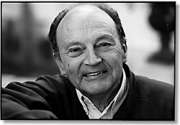|
Биография Michel Tournier
Nume de referinta al literaturii franceze contemporane, Michel Tournier s-a nascut la Paris, in 1924. Urmeaza cursuri de filosofie la Sorbona si la Universitatea din Tübingen.
Colaboreaza la Radiodifuziunea Franceza, apoi la postul de radio Europe I. De mai bine de patruzeci de ani traieste in casa parohiala a unui sat minuscul situat la patruzeci de kilometri de Paris. A debutat in 1967 cu romanul „Vineri sau Limburile Pacificului”, incununat cu Marele Premiu pentru roman al Academiei Franceze.
In 1970 publica „Regele Arinilor”, laureat cu Premiul Goncourt. In 1972 ii apare romanul „Meteorii”, urmat de eseul „Vintul Paraclet” (1977), volumele de nuvele „Cocosul de munte” (1978, aparut in limba romana cu titlul „Piticul rosu”) si „Zborul Vampirului” (1982), romanele „Gilles & Jeanne” (1983), „Picatura de aur” (1986) etc.
Din 1972 este membru al Academiei Goncourt. In 1993 i s-a decernat Medalia Goethe, iar in 1997 a primit titlul de Doctor Honoris Causa al Universitatii din Londra.
La Editura Polirom au aparut: „Gaspar, Melhior & Baltazar” (2003), „Picatura de aur” (2003) si „Fecioara si capcaunul” (2004).
***
Michel Tournier (born 19 December 1924) is a French writer.
His works are highly considered and have won important awards such as the Grand Prix du roman de l'Académie française in 1967 for Vendredi ou les limbes du Pacifique. and the Prix Goncourt for Le Roi des aulnes in 1970. His works dwell on the fantastic, his inspirations including traditional German culture, Catholicism, and the philosophies of Gaston Bachelard. He currently lives in Choisel and is a member of the Académie Goncourt. His autobiography has been translated and published as The Wind Spirit (Beacon Press, 1988).
Born in Paris from parents who met at the Sorbonne while studying German, he spent his youth in Saint-Germain-en-Laye. He learned German early, staying each summer in Germany. His education was deeply marked by the German culture, music and Catholicism. Later he discovered the thought of Gaston Bachelard.
He studied philosophy at the Sorbonne and at the university of Tübingen and attended Maurice de Gandillac's course. He wished to teach philosophy at high-school but, like his father, failed to obtain the French agrégation.
He joined Radio France as a journalist and translator and hosted L'heure de la culture française. In 1954 he worked in advertisement for Europe 1. He also collaborated for Le Monde and Le Figaro.
From 1958 to 1968, he was the chief editor of Plon.
In 1967 he published his first book, Vendredi ou les Limbes du Pacifique, retelling Daniel Defoe's Robinson Crusoe, adding to the story a philosophical depth. He was awarded the Grand Prix du roman de l'Académie française for it.
Selected works
Vendredi ou les Limbes du Pacifique (Friday) (1967) - Grand Prix du roman de l'Académie française
Le Roi des aulnes (1970) (The Erl-King translated 1972 by Barbara Bray, aka The Ogre)
Le Roi des aulnes was made into a 1996 movie Der Unhold (The Ogre) directed by Volker Schlöndorff
It has also been adapted for the stage by Tom Perrin. This originated as a post-graduate research project at the Mountview Academy of Dramatic Arts in 2002. The show The Erl King was then taken to the 2003 Edinburgh Festival.
Les Météores (Gemini, 1975)
Le Vent Paraclet (The Wind Spirit, 1977)
Vendredi ou la Vie sauvage (Friday and Robinson, 1977)
Le Coq de bruyère (The Fetishist and Other Stories, 1978)
Gaspard, Melchior et Balthazar (The Four Wise Men, 1980)
Le Vol du vampire (1981)
Gilles et Jeanne (Gilles and Jeanne, 1983)
La Goutte d'or (The Golden Droplet, 1986)
Petites Proses (1986)
Le Medianoche amoureux (The Midnight Love Feast, 1989)
La Couleuvrine (1994)
Le Miroir des idées (The Mirror of Ideas, 1994)
Eléazar ou la Source et le Buisson (Eleazar, Exodus to the West, 1996)
Journal extime (2002)
|





